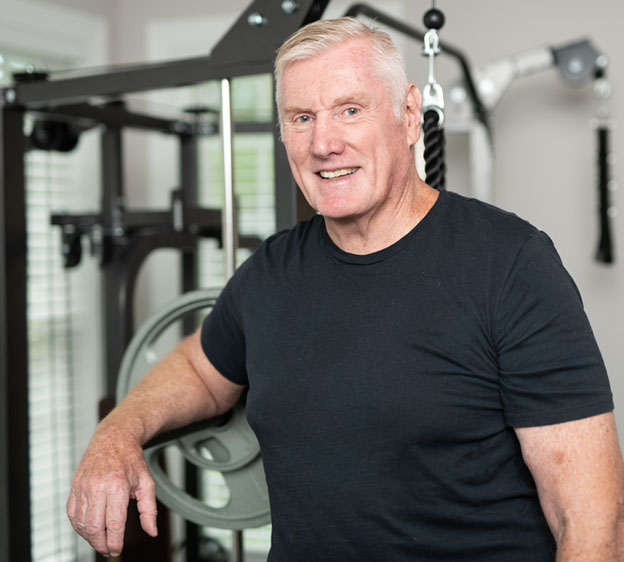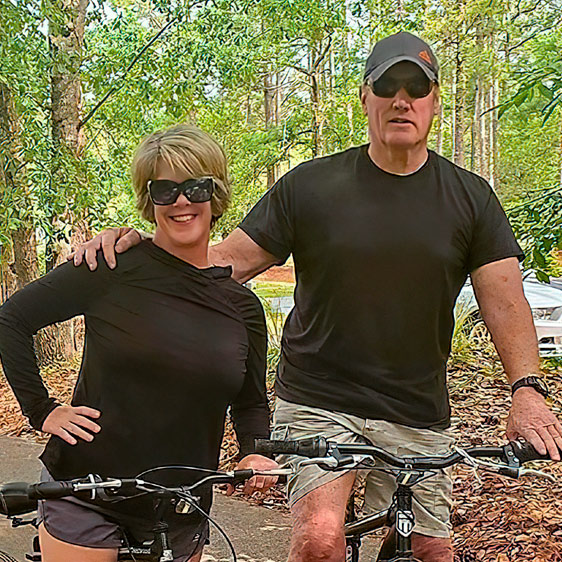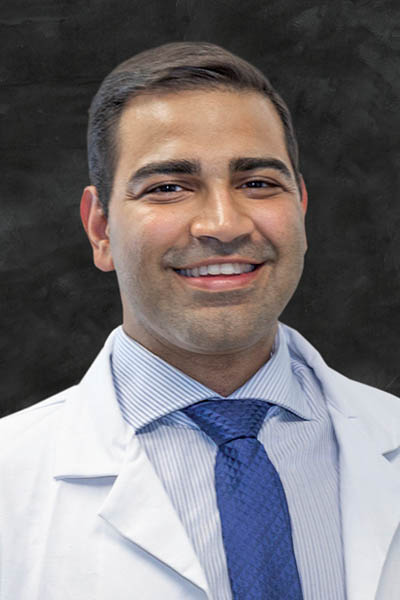
When David Collins decided it was time to schedule knee replacement surgery, he likely had a better understanding of what he was getting into than even the best-informed patients.
Collins sold orthopedics for one of the major manufacturers of replacement joints for much of his career. His new knees were, in fact, crafted by his former employer.
“I’ve been in the operating room any number of times,” he said. “I saw knee replacements and hip replacements and knew what the procedure involved.”

Now 70, the Bluffton resident is extraordinarily active. In addition to his successful real estate business, Collins enjoys hiking, biking, kayaking and spending time in the gym. And he’s a lifelong rugby enthusiast, remaining involved with the sport – known for its high level of physical contact and the toughness of its players – until relatively recently.
“I played rugby until three years ago,” he says. “I was the slowest guy on the field, but I was still playing.”
Despite Collins’ familiarity with joint replacement surgery, he made the personal decision to delay replacing his painful knees for as long as he could. He based that on a number of factors, including his understanding of the expected lifespan of a replacement knee, an expectation of his likely lifespan, and his desire to avoid knee revision – having the replacement knee replaced after it wears out – later in life. As a result of that calculus, Collins held off on the surgery until earlier this year.
By the time he underwent surgery at Beaufort Memorial Hospital, he’d been experiencing bone-on-bone knee pain for a while.
Read More: What to Expect After Knee Replacement Surgery
“In retrospect, I should have done it earlier so I could have been pain-free sooner and enjoyed a better quality of life,” said Collins.
But when he did make the move, he made it quickly. He had total knee replacement surgery done on both knees within 90 days of one another, starting with his left knee in March and following up with his right knee in June.
“I was in Savannah with my wife, walking over cobblestone, up and down stairs, and I’d had it,” he said. “I just couldn’t do it anymore. There’s nothing that relieves that kind of pain.”
Collins’ knee replacements were done using the Mako Robotic Arm-Assisted Surgery System. This technology allows a surgeon to create a surgical plan unique to a patient’s anatomy. The robotic arm is then used to implant the components with greater precision, leading to better function, more natural movement, ideal positioning and increased longevity.
Further, computer modeling helps surgeons determine where to make the cuts to ensure that the knee is balanced, meaning that the tension on the ligaments is equal on both sides of the knee. This balance means that a patient gets their range of motion back more easily and sees a quicker recovery.
Read More: Move Better on New Knees
After each of Collins’ surgeries, he was able to leave the hospital the same day. Most Beaufort Memorial joint replacement patients will spend one night in the hospital, but about a third are able to go home the same day.

Collins believes that his general level of fitness and that his wife, Maureen, is a BMH nurse helped him avoid the overnight stay.
Three weeks after his knee replacements, Collins was back in Savannah, this time for a concert. Unlike the trip that prompted his decision to replace his knees, this time he had no such discomfort.
“Knee replacement has changed my life,” he said. “I’m bouncing around, going up and down stairs. For 20 years, handrails had been my best friend. I don’t need a handrail anymore.”
With two new knees, Collins is now cautiously considering a return to the rugby pitch.
“My goal would be to play rugby again,” he said. “There’s a tournament every year in Aspen. At 71 or 72, I think I would be like a 35-year-old against those guys.”
Is your knee or hip pain keeping you from enjoying your favorite activities? Call 843-522-7435 to speak with our orthopedic care coordinator or request an appointment with one of our orthopedic specialists.

